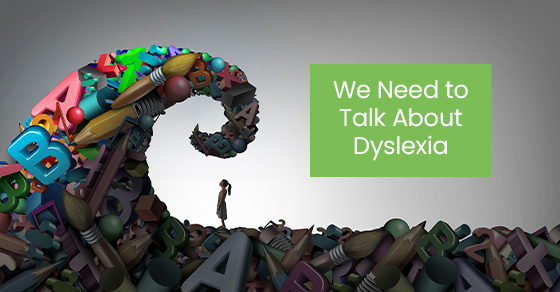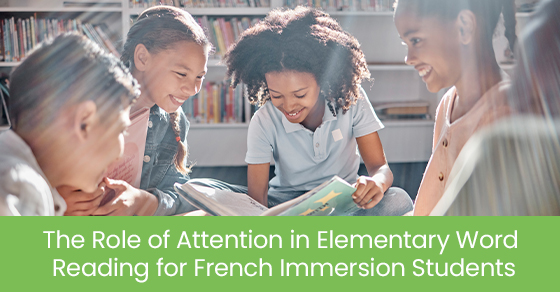Dyslexia, a term often misunderstood and underutilized in education, significantly affects a person’s ability to read and write, despite their normal intelligence and vision. Students with dyslexia not only encounter difficulties in reading and writing, but also have challenges with spelling, leading to slow reading comprehension and frequent errors. Despite the prevalence of dyslexia—estimated to affect around 10% of school-age children—there is a lack of understanding and recognition of the disability within educational systems (Peterson & Pennington, 2012). Recent studies also indicate that dyslexia frequently occurs alongside other learning difficulties, including oral language, math, and attention deficits (Archibald et al., 2013; Stevenson et al., 2005).
The American Psychiatric Association’s Diagnostic and Statistical Manual of Mental Disorders, Fifth Edition defines dyslexia as a pattern of learning difficulties characterized by poor word recognition, decoding, and spelling abilities. The implications of dyslexia extend beyond the classroom. Students with the disability experience higher school drop-out rates and lower rates of postsecondary training pursuit (Daniel et al., 2006). In today’s economy, low literacy becomes a risk factor for underemployment, homelessness, incarceration, mental health disorders, and addiction (Livingston, Siegel & Ribary, 2018).
Dispelling Myths About Dyslexia
Common myths about dyslexia often revolve around visual disorders, such as the misconception that dyslexic people see letters and words backward or upside down. These errors are common in early readers, and dyslexic individuals do not exhibit unusual visual difficulties (MacDonald et al., 2017). Instead, dyslexia is rooted in a profound impairment in the spoken form of language known as “phonology,” the systems of sounds within a language (Ramus, 2004; Verhoeven, Perfetti & Pugh, 2019; Ziegler & Goswami, 2005). According to Guinevere Eden, director of Georgetown University’s Center for the Study of Learning, people with dyslexia have problems sounding out words. Learning to read requires co-opting parts of the brain and training them to recognize letters, putting those letters together into small units, relating those units to sounds, and then blending those sounds into a word. For the millions of people with dyslexia, that process is weak (Emanuel, 2016). Phonological processing is essential for learning to read, as it forms the basis for understanding the relationship between sounds and written words. Dyslexia disrupts phonological processing, leading to difficulties in learning and applying letter-sound associations.
Another persistent fallacy is the idea that individuals with dyslexia have lower intelligence. Dyslexia has no correlation with intellectual capabilities. Many individuals with dyslexia are of average or above-average intelligence. The challenges faced by people with dyslexia are specific to reading, writing, and spelling, and do not reflect their overall cognitive abilities. Intelligence is a multifaceted trait, and dyslexia does not diminish an individual’s capacity for critical thinking, problem-solving, or other cognitive skills.
While dyslexia is commonly associated with difficulties in reading, it is not limited to that domain. The effects of dyslexia extend beyond reading difficulties and may impact many aspects of academic and daily life. Recognizing the broader spectrum of difficulties associated with dyslexia is important for providing comprehensive support and intervention strategies.
The Right to Read
In 2019, the Ontario Human Rights Commission launched the Right to Read inquiry, which revealed a significant gap between scientific knowledge and practical application in the way reading is taught. The inquiry found that Ontario’s public education system fails to adequately support students with dyslexia because of a lack of evidence-based approaches to reading instruction. A critical recommendation from the inquiry was the explicit recognition of the term “dyslexia” instead of the generic term “learning disability.”
The importance of using the term “dyslexia” lies in tailoring support services to the unique needs of each student. The term “specific learning disability” is sometimes used as an eligibility category, but it fails to provide the specificity required for effective individualized instruction and intervention. The inquiry emphasized the need for proper diagnosis and evidence-based approaches to benefit students with dyslexia.
Empowering Reading Tutors
Reading tutors play a crucial role in supporting students with dyslexia. Understanding the neurobiology of the disability and becoming familiar with research-informed intervention strategies are essential aspects of effective tutoring. While dyslexia may have a hereditary component, neural systems are malleable, and targeted interventions can make a significant impact. At Evoke, our reading tutors offer structured, systematic, and individualized instruction that addresses the unique challenges of dyslexia while building on the student’s strengths. Regular assessment and student progress monitoring ensure that interventions are working, and adjustments can be made as needed.
Recommended Reading
To understand how scientific knowledge can be translated into successful classroom strategies, educators and parents may find these books informative:
The Dyslexic Advantage by Brock L. Eide and Fernette F. Eide
Dyslexia: A Practitioner’s Handbook by Gavin Reid
Overcoming Dyslexia by Sally Shaywitz
These resources provide helpful insights into understanding dyslexia, implementing evidence-based strategies, and fostering a supportive learning environment.


